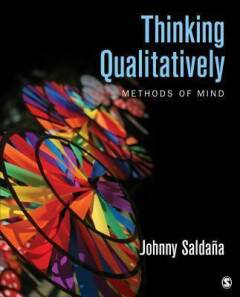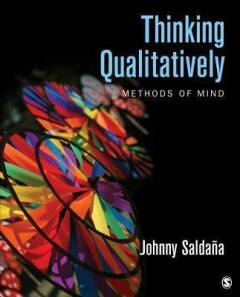
- Retrait gratuit dans votre magasin Club
- 7.000.000 titres dans notre catalogue
- Payer en toute sécurité
- Toujours un magasin près de chez vous
- Retrait gratuit dans votre magasin Club
- 7.000.0000 titres dans notre catalogue
- Payer en toute sécurité
- Toujours un magasin près de chez vous
Description
Written in Johnny Saldaña′s elegant and accessible style, Thinking Qualitatively: Methods of Mind boldly pursues the challenge of teaching students not just how to collect and analyze data, but how to actively think about them. Each chapter presents one "method of mind" (thinking analytically, realistically, symbolically, ethically, multidisciplinarily, artistically, summarily, interpretively, and narratively), together with applications, a vignette or story related to the thinking modality, points to remember, and exercises. Designed to help researchers "rise above the data," the book explores how qualitative research designs, data collection, data analyses, and write-ups can be enriched through over 60 different lenses, filters, and angles on social life. Venturing into more evocative and multidimensional ways to examine the complex patterns of daily living, the book reveals how the researcher′s mind thinks heuristically to transcend the descriptive and develop "highdeep" insights about the human condition. "This is a book for all qualitative methodologists. Not just a 'how-to' manual but an epistemological exercise in understanding qualitative methods." --Cassie F. Quigley, Clemson University "This book fills an important void in the field. The market is crowded with books on techniques and strategies for conducting qualitative research. Saldaña's volume provides a vital complement by encouraging students to develop the core analytical skills and interpretive frames they need to be truly successful in their research endeavors. He helps students flex and hone the epistemological muscles that are at the center of capable qualitative research." --John P. Bartkowski, University of Texas at San Antonio "The focus of the book is clear and consistent. The writing is superb. It deals with sophisticated ideas in a clear and highly communicative style. It weaves important and relevant scholarship in ways that help the reader grasp the key ideas. It's one of the best books I have read." --Liora Bresler, University of Illinois at Urbana-Champaign "Thinking Qualitatively invites students to think before they act and offers a rich set of options for qualitative researchers to consider." --Michael Brown, University of Wyoming "This book brings together key ways of thinking about our work as qualitative researchers. In many ways, it captures the breadth and depth of our work, while calling for us to be ever reflexive about our practices. I see this book as positively informing the work of novice and experienced researchers. It is a much needed addition to the qualitative research community." --Jessica Nina Lester, Indiana University
Spécifications
Parties prenantes
- Auteur(s) :
- Editeur:
Contenu
- Nombre de pages :
- 240
- Langue:
- Anglais
Caractéristiques
- EAN:
- 9781483349831
- Date de parution :
- 25-09-14
- Format:
- Livre broché
- Format numérique:
- Trade paperback (VS)
- Dimensions :
- 187 mm x 228 mm
- Poids :
- 476 g

Les avis
Nous publions uniquement les avis qui respectent les conditions requises. Consultez nos conditions pour les avis.






